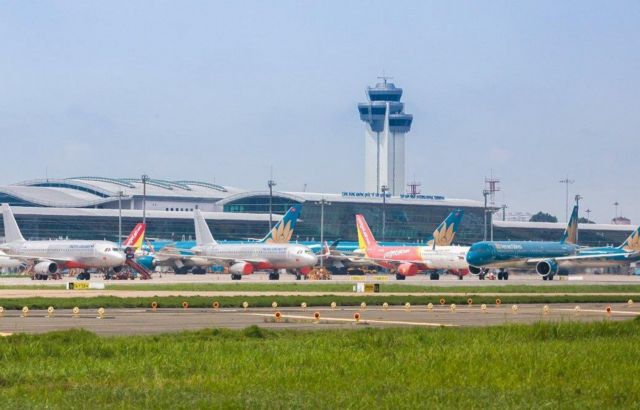 |
|
Tan Son Nhat International Airport in HCM City. |
Speaking at a meeting on Friday on the resumption of domestic flights in Việt Nam, Võ Huy Cường, deputy director of the Civil Aviation Administration of Việt Nam (CAAV), said that out of 21 localities that were consulted for reopening domestic flights, Quảng Ninh and Quảng Nam provinces have not yet responded.
The localities agreeing to reopen domestic flights include HCM City, Đà Nẵng, Cần Thơ, Nghệ An, Điện Biên, Thừa Thiên - Huế, Quảng Nam, Đắk Lắk, Lâm Đồng, Phú Yên, Bình Định, Bà Rịa - Vũng Tàu, Khánh Hòa, Thanh Hóa, Cà Mau, and Kiên Giang.
On September 29, Hà Nội leaders sent a report to the Prime Minister, asking not to reopen flights to and from the city.
The Ministry of Transport suggested reopening domestic flights to and from Hà Nội with low frequency. But the capital leaders mentioned the request sent to the Prime Minister earlier.
While Hải Phòng City leaders also turned down the suggestion and didn’t set a specific date for resuming flights, Gia Lai Province said it might consider the activity after October 15.
Cường from the CAAV said the decision to reopen flights depends on the capacity of each locality in logistics and medical situation.
“The transport ministry can’t unilaterally make the final decision on reopening flights, it would not ensure the requirements of pandemic control and prevention,” Cường said.
Earlier this month, the Civil Aviation Authority of Vietnam (CAAV) proposed to the Ministry of Transport a plan to re-open domestic air routes from October 1.
The leader of the Civil Aviation Administration of Vietnam said that the fact that 16 provinces and cities agreed to open the routes "shows the bravery of local leaders”.
He said the resumption of transport is necessary for the economy, as long as passengers have been fully vaccinated.
“To restart domestic flights, it needs the support and determination of local leaders. Localities are not a country that can be completely self-sufficient and stay separated from neighbouring provinces and neighbouring countries,” Cường said.
The reconnection of transport and aviation needs to be done immediately, he said.
Initially, it can be done on a small scale and then expand, he said.
Trần Đắc Phu, a senior advisor of the Public Health Emergency Operations Centre, said the Ministry of Health has classified high-risk and low-risk areas. It is normal to travel to and from low-risk areas. Travelling in high-risk areas can also be allowed for people who have been fully vaccinated.
Phu said that it is very difficult for the Prime Minister to adopt a safe, flexible and effective approach to control the pandemic. Especially for the aviation industry, it is even more difficult because the vaccination rate in Việt Nam is still low and uneven.
He said that when opening domestic routes, the burden of responsibility will be on localities with low vaccination rates.
"So, to control the pandemic effectively, we must take into account the risk and vaccination rate," Phu said, adding that there should be regulations on how to both restart aviation and still control the pandemic
"Currently there are localities who are applying too strict measures, we can't open this door but close another. In a matter that relates to many localities like this, there should be flexible and rational regulations," he said.
Source: VNS